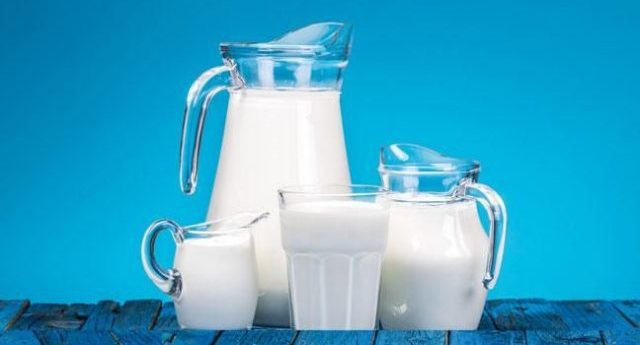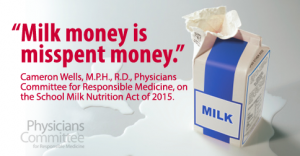
Turns Out Milk & Dairy Products are NOT Good for You!
Today, Americans consume an enormous amount of dairy. The intake of the average American is estimated to be over 600 pounds of dairy products per year.
How many “Got Milk” advertisements have you seen on TV and magazines with all those picture perfect celebrities with a milk mustache? It’s beaten into our consciousness at an early age in the American education system that milk is good for you. You need it to have strong bones and to prevent osteoporosis right? Successful marketing by the dairy industry.
In the words of Maury Povich, “It turns out, that was a lie.”
According to Dr. Mark Hyman, some of the “experts” who helped create the USDA food pyramid actually work for the dairy industry, which makes the US Department of Agriculture’s recommendations reflect industry interests, not science or our best interests.
“Dairy is nature’s perfect food — but only if you’re a calf. If that sounds shocking to you, it’s because very few people are willing to tell the truth about dairy. In fact, criticizing milk in America is like taking on motherhood, apple pie, or baseball.”
-Dr.Mark Hyman
Clinical research shows that dairy products have little or no benefit for bones. A 2005 review published in Pediatrics showed that milk consumption does not improve bone integrity in children.

About 75 percent of the world’s population is genetically unable to properly digest milk and other dairy products — a problem called lactose intolerance. Maybe because dairy products were NEVER meant to be consumed by humans!
Dairy and Cancer
Consumption of dairy products has also been linked to higher risk for various cancers, especially to cancers of the reproductive system. Most significantly, dairy product consumption has been linked to increased risk for prostate and breast cancers.
In a large study including 1,893 women from the Life After Cancer Epidemiology Study who had been diagnosed with early-stage invasive breast cancer, higher amounts of high-fat dairy product consumption were associated with higher mortality rates. As little as 0.5 servings a day increased risk significantly
Casein is the main protein in dairy, and studies have shown that it facilitates the growth and development of cancer. In fact, some studies even found that cancer development could be controlled more by casein levels in diet than by exposure to the underlying carcinogen.
Even Organic Milk Usually Contains Hormones
Dairy is a significant source of female hormone exposure. Commercial cow’s milk contains large amounts of estrogen and progesterone, which is a serious concern. This is further exacerbated by modern dairy cows being genetically altered to continuously produce milk – even throughout their repeated pregnancies.
Even milk products labeled “organic” or “no hormones added” usually contain high levels of these problematic hormones, which are naturally produced by cows (even if those cows have not been given any additional hormones for purposes of the product label).
Higher Risk of Type 1 Diabetes and Multiple Sclerosis
Our immune system normally protects us from microbes and other harmful substances. But if it loses its ability to recognize and distinguish harmful substances from normal tissues and cells, it can instead mount attacks against our own bodies.
These “auto-attacks” can be triggered by exposure to foreign peptides (including animal protein fragments found in dairy), which have similarities to components in the human body. This can result in our immune system becoming “confused” and misidentifying tissues in our body as “foreign” and thus in need of being attacked and destroyed.
Dairy is associated with increased risk of several immune-related disorders (from allergic conditions to autoimmune diseases), many being life-changing and difficult to treat. The associations with type 1 diabetes and multiple sclerosis are particularly concerning:
- Type 1 Diabetes. In type 1 diabetes (also called juvenile diabetes or insulin-dependent diabetes mellitus (IDDM)), the immune system attacks the pancreas, resulting in the body no longer being able to produce insulin to regulate glucose. Multiple large-scale studies have identified an association between cow’s milk consumption and increased prevalence of type 1 diabetes.One such study found that “cows’ milk may contain a triggering factor for the development of IDDM,”and another found that early cow’s milk exposure may be an important determinant of subsequent type 1 diabetes and may increase the risk approximately 1.5 times.
- Multiple Sclerosis. In multiple sclerosis (MS), the immune system attacks the insulating sheath of our own nervous system, resulting in a variety of difficult-to-treat and unpredictable neurologic problems. As with type 1 diabetes, numerous studies have reported that cow’s milk consumption may be a significant risk factor for developing MS.
Each mammalian species produces milk for its own babies, and the content of proteins, fats, carbohydrates and minerals is specific to provide optimum nutrition for a baby of that particular species. The milk from an elephant, tiger, sea lion and cow are each different from one another, and they are all different from human milk.
Milk doesn’t benefit sports performance. Dairy aggravates irritable bowel. Yes, raw, whole, organic milk eliminates concerns like pesticides, hormones, antibiotics, and the effects of homogenization and pasteurization — but do these benefits outweigh dairy’s potential risks? I think non-industry funded scientific studies is saying NO!
Sources:
http://drhyman.com/blog/2010/06/24/dairy-6-reasons-you-should-avoid-it-at-all-costs-2/
Source: https://prepareforchange.net/2018/02/23/7-ways-milk-dairy-products-making-sick/
https://www.bustle.com/articles/137195-7-reasons-milk-is-bad-for-you
source:http://www.pcrm.org/health/diets/vegdiets/health-concerns-about-dairy-products

 My First Amazing Ayahuasca Experience
My First Amazing Ayahuasca Experience  Pine Needle Tea
Pine Needle Tea  The REAL Controllers of Humanity: The Papal Bloodlines
The REAL Controllers of Humanity: The Papal Bloodlines  Is it Global Warming or Cooling?
Is it Global Warming or Cooling?  Gun Rights and Obama Examined
Gun Rights and Obama Examined